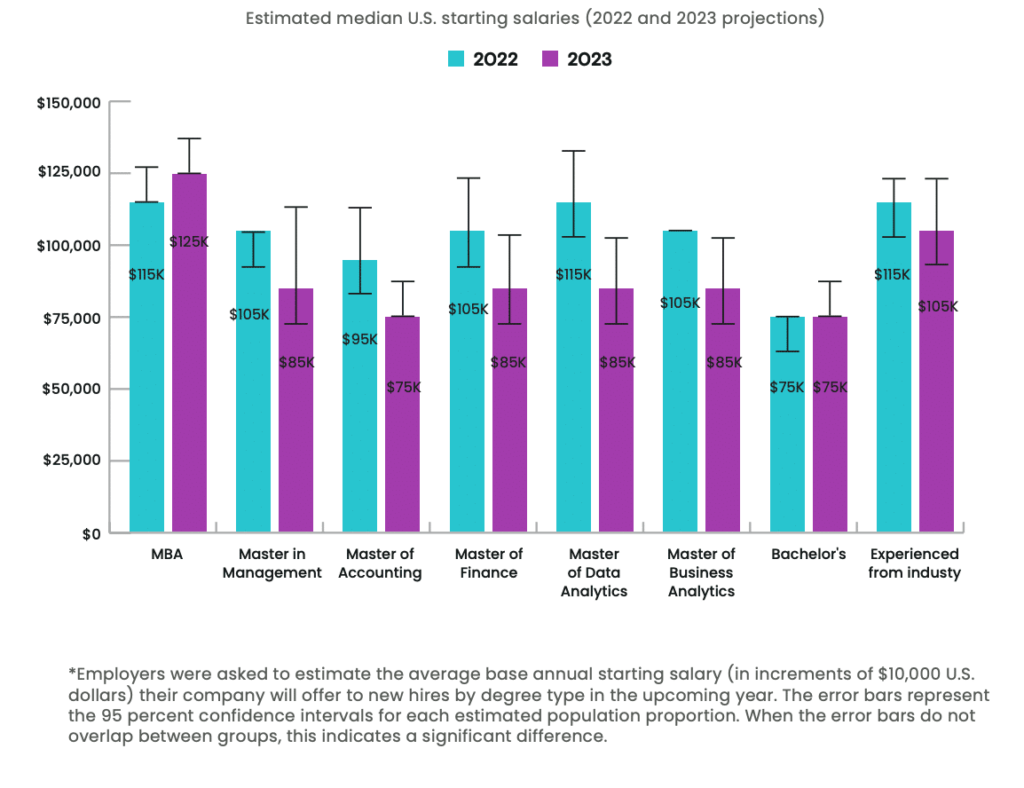Growth in starting salaries for Master of Business Administration (MBA) graduates will outstrip inflation this year despite looming economic challenges, according to a new survey of recruiters from around the world.
The 2023 Corporate Recruiters Survey by the Graduate Management Admission Council (GMAC) asked recruiters from around the world to predict salary and hiring trends for the current year.
While economic pressures mean projected salary and compensation packages have shifted somewhat compared to 2022 estimates, the sentiment among employers remains generally positive.
READ MORE: Tough Economic Conditions Fail To Dent Demand For MBAs and Business School Graduates
Nearly 70 percent of employers say employees with GME (Graduate Management Education) degrees, including MBAs, tend to earn more at their companies than others, which is largely consistent across region, industry, and company size.
The report shows MBAs, especially in the United States, have been less affected by changes in employee compensation plans compared to those with more specialised master’s degrees.
“The estimated 2023 median salary for US MBAs increased compared to 2022 projections, while predicted salaries for master’s graduates in 2023 dropped from 2022’s projections,” the report said.
“In 2022, employers predicted U.S. MBAs would be offered the same median starting salaries as those with experience coming direct from industry and those with a Master of Data Analytics.
“Compared to these 2022 projections, MBAs are estimated to receive a nominal $10,000 increase in 2023, while U.S. employers project a $10,000 salary decrease among those direct from industry; a $20,000 decrease among those with master’s degrees in management, accounting, finance, and business analytics; and a $30,000 decrease among Master of Data Analytics hires.”

Projected bachelor’s degree salaries have remained steady since employer estimates in 2022, though the real value of all these salaries in 2023 is likely to further decrease due to inflation.
Leveraging the U.S. Bureau of Labor Statistics’ Consumer Price Index Inflation calculator, a $115,000 salary in February 2022 equates to about $122,000 in February of 2023, meaning employers are predicting U.S. MBAs will receive a modest salary bump even after accounting for inflation.
However, these year-over-year changes in projections are not statistically significant (with the exception of the Master of Business Analytics), meaning 2023 salary estimates may not have meaningfully changed since 2022.
Importantly, there are limitations to these starting salary estimates. Perhaps most consequentially, starting salary is not necessarily the best measure of the value of a GME degree compared to lifetime earnings.
Georgetown University’s Center on Education and the Workforce “The College Payoff” study continues to show that median earnings rise with each additional level of education.
Unlike estimated salaries, which are mostly predicted to lose some value in 2023, employers are a bit more optimistic about hiring trends for 2023.
The increased salary expectations match hiring plans, with employers anticipating growth in business master’s hiring compared to 2022 actual results.
“Most employers across several industries report wanting to increase their headcount, and nearly all organizations are looking to increase or stabilize their size,” the report said.
“Hiring projections in key industries look similar to 2022’s actual hiring results, though are a bit less optimistic than 2022 projections. Employers are likely to place graduates of specialized master’s into corresponding roles, and business master’s talent is anticipated to get a small bump in hiring in 2023.”
Overall, hiring is likely to be highest among MBAs and experienced industry candidates who are likely to have capabilities that appeal to a wider range of company types. These candidates fared best across regions, and Master in Management and Master of Data Analytics graduates had the most success among specialized master’s programs. Large, publicly traded companies hired more GME graduates across degree types compared to other private, nonprofit, and government organizations.







